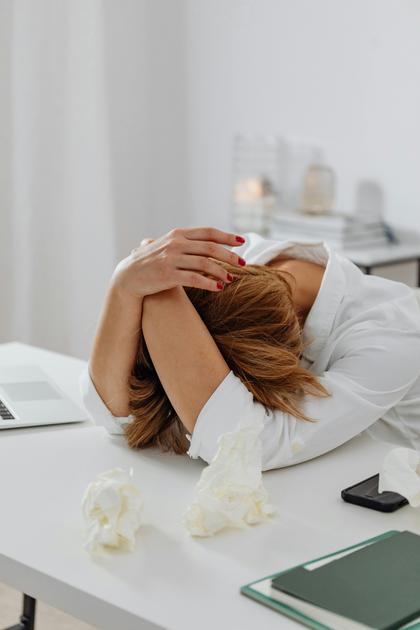Anxiety in Women: Transform Your Life with Simple Changes!
Many women over 30 experience the silent struggle of anxiety, often overshadowed by the demands of daily life. This invisible burden can manifest in various ways, such as fatigue, insomnia, and emotional turmoil. However, it is important to know that you are not alone in this journey. By making intentional lifestyle changes, you can find relief and reclaim your peace of mind. This article will explore practical steps that empower you to navigate through anxiety and rediscover joy in your life.
Understanding Anxiety in Women’s Lives
Anxiety is a common experience that many women face, particularly as they grow older. For women over 30, various life changes, responsibilities, and societal pressures can amplify anxiety levels. Balancing careers, family, and personal aspirations often leaves little room for self-care. It’s essential to understand how anxiety manifests in our lives and realize that we are not alone in this journey.
Women often feel the weight of expectations. Are you constantly worrying about meeting deadlines at work, managing household chores, or being the perfect parent? This pressure can lead to an overwhelming sense of anxiety and unease. It is crucial to recognize that these feelings are valid, and addressing them can lead to a healthier, more fulfilling life.
Common Symptoms of Anxiety in Women Over 30
Understanding the symptoms of anxiety can help you recognize what you might be experiencing. Common signs include:
- Restlessness: You may feel on edge or have difficulty relaxing.
- Irritability: Small annoyances might trigger significant frustrations.
- Fatigue: Constantly feeling tired, even after sleeping, can be a sign.
- Difficulty concentrating: It may feel like your mind is in a fog.
- Sleep disturbances: Insomnia or oversleeping can disrupt your routine.
- Physical symptoms: Headaches, stomach problems, and muscle tension may occur.
Recognizing these symptoms is the first step towards seeking support and making changes that can help ease anxiety.
The Impact of Lifestyle on Mental Health
Your everyday choices greatly impact your mental health. The relationship between lifestyle and anxiety is complex but crucial. Stressful jobs, lack of exercise, and poor eating habits can contribute to heightened anxiety. As women, we often prioritize everything and everyone else over our own well-being.
Consider how your daily routine supports or hinders your mental health. Are you giving yourself enough time to breathe? Making small changes can lead to significant improvements in your emotional state.
Simple Changes for Stress Reduction
Reducing stress can play a vital role in managing anxiety. Here are some simple yet effective changes you can make:
- Practice time management: Organizing your day can eliminate last-minute chaos and provide structure.
- Set boundaries: Learn to say no. Protect your time and energy.
- Engage in hobbies: Spend time doing things you love. Whether it’s painting, gardening, or reading, make space for joy.
- Deep breathing exercises: When feeling anxious, pause and take deep breaths. This can help ground you in the moment.
Implementing these changes into your routine can lower stress levels and promote a sense of calm.
The Role of Diet in Managing Anxiety
What you eat can influence your mood and anxiety levels. A balanced diet rich in whole foods provides the nutrients necessary for optimal brain function. Here are some dietary tips to combat anxiety:
- Include omega-3 fatty acids: Foods like salmon, walnuts, and flaxseeds support brain health.
- Prioritize whole grains: Brown rice, quinoa, and whole wheat bread can stabilize blood sugar levels.
- Incorporate fruits and vegetables: These are packed with vitamins and antioxidants that support mental well-being.
- Avoid excessive caffeine and sugar: High sugar and caffeine intake can exacerbate anxiety symptoms.
Simple adjustments to your diet can even lead to noticeable improvements in your mood and anxiety levels.
Importance of Physical Activity for Mental Well-being
Exercise is a powerful tool for managing anxiety. Engaging in regular physical activity can help release endorphins, the body’s natural mood lifters. Consider the following:
- Regular walks: A simple daily walk can significantly boost your mood.
- Join a fitness class: Group classes offer social interactions while keeping you active.
- Try yoga: Yoga combines movement with mindfulness, which is effective for reducing anxiety.
Start small and aim for at least 30 minutes of exercise most days of the week to reap the benefits of physical activity for your mental health.
Mindfulness Techniques to Ease Anxiety
Practicing mindfulness can help ground you in the present moment and reduce feelings of anxiety. Here are some techniques to incorporate into your routine:
- Meditation: Spend a few minutes each day meditating to clear your mind.
- Journaling: Write down your thoughts and feelings. This can provide a release and help organize your emotions.
- Gratitude exercises: Focus on what you are thankful for each day. This fosters a positive mindset.
Mindfulness is a practice that takes time but can profoundly impact your mental health.
Creating a Supportive Community
Having a strong support system is essential for managing anxiety. Engaging with friends, family, or support groups can provide comfort and understanding. Consider the following:
- Reach out: Don’t hesitate to talk about your feelings with trusted loved ones.
- Join support groups: Connecting with those who share similar experiences can lessen feelings of isolation.
- Volunteer: Helping others builds connections and enhances your sense of purpose.
Building a supportive community makes the journey through anxiety feel less daunting.
Establishing Healthy Sleep Habits
Sleep plays a crucial role in managing anxiety. Lack of rest can heighten feelings of stress and irritability. Here are ways to promote better sleep:
- Maintain a sleep schedule: Go to bed and wake up at the same time each day.
- Create a bedtime routine: Wind down with calming activities like reading or taking a warm bath.
- Limit screen time: Reduce exposure to screens at least one hour before bed to improve sleep quality.
Making sleep a priority can significantly help reduce your anxiety levels and improve overall well-being.
Embracing Self-Care: A Path to Healing
Self-care isn’t selfish; it’s essential. Taking time for yourself can drastically impact your mental health. Here are some self-care tips:
- Schedule “me time”: Dedicate part of your week purely for activities that make you happy.
- Try new things: Step out of your comfort zone and explore new experiences.
- Practice self-compassion: Speak to yourself kindly. Acknowledge that it’s okay not to be perfect.
Embracing self-care can lead to a brighter outlook on life and reduce anxiety.
Remember, it’s entirely possible to improve anxiety symptoms. Many women before you have walked this path and found relief through simple, manageable changes in their lives. Step forward into a world of possibilities and take the first step towards a more peaceful existence! Discover the solution that countless women have already embraced.













